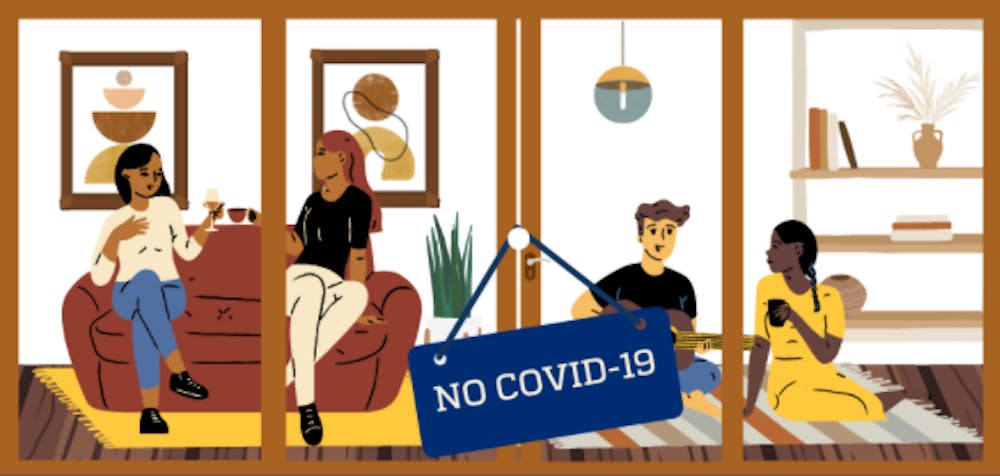As we emerge from the isolated gloom of winter into the bright spring days, there is hope in the air. The weather is finally warm, trees are blooming and the COVID-19 vaccine is available to everyone 16 and over. The February cluster of student cases is a distant memory, and it’s finally time to hug our friends again.
The pandemic is over!
Not so fast. While the Centers for Disease Control recently issued new guidelines for those who are fully vaccinated, they still highlight the necessity for everyone — regardless of immunization status — to wear a mask and social distance in public, and avoid large gatherings.
To return to some semblance of normalcy, we must first reach herd immunity. For airborne viruses like COVID-19, experts estimate that we’ll achieve this level once 50-80% of the population has received their vaccines. As of April 28, only 29% of the U.S. population is fully vaccinated.
However, some public health measures have led students to feel isolated. In a recent survey of 277 Hopkins undergraduates conducted by PodGoalsJHU, the School of Public Health’s student-led pod initiative, 66% of students reported that their mental health has suffered as a result.
What if we could exit the pandemic while still hanging out with friends —without masks — guilt-free? You can do so by forming a pod.
PodGoalsJHU defines a pod as, “a closed group of trusted friends or family who commit to socializing exclusively with one another without practicing social distancing.”
Forming a pod allows you and your pod mates to return to some routine. And students have caught on: Over half of surveyed students are or have been in a COVID-19 pod, and 71% of Hopkins undergraduates said it would be easy to do.
If you’re new to podding, consider creating one with a small group of close friends (six to eight) with whom you spend the most time. For communal peace of mind, it helps to have shared values about health, risk and COVID-19 safety to make it easier to agree on pod rules.
If you live off campus, consider your roommates. You can even join another apartment’s pod or include a romantic partner — just ensure everyone knows who is in the pod, and who you need to be masking around.
Even so, the truth is that our social networks are a lot larger than we think. You may believe your pod is just your four roommates, while your roommate thinks the pod includes you four and her boyfriend and his best friend's girlfriend. In fact, 40% of Hopkins undergraduates believe you can safely be in more than one pod at a time. Because of this, a pod of six may unknowingly include 33 others — plus COVID-19.
To circumvent this, clearly define who is in your pod, set ground rules and maintain open communication with your pod mates. In the PodGoalsJHU survey, 78% of undergraduates agreed that people who live together have a responsibility to communicate with each other about their COVID-19 risks.
Unfortunately, accidentally violating your pod rules can be as easy as forgetting to mask while running in to borrow salt from your neighbor’s apartment. And in the worst-case scenario, it could mean two weeks of quarantine for the whole group. According to the survey, a third of Hopkins undergraduates reported a COVID-19 exposure in their pod, and another 30% said they were not sure whether an exposure had occurred.
On top of that, there are always people outside of our pods that we miss and are tempted to meet. Indeed, 44% of Hopkins undergraduates reported that they would rather take a risk with COVID-19 than not see their friends and family. However, lying or hiding a breach can seriously damage trust within a pod.
When it comes to keeping you and your pod mates healthy, be transparent and take responsibility if you mess up. Remember to stay masked and follow Hopkins COVID-19 guidelines while on campus and in public spaces.
Along with masking, social distancing, hand hygiene and getting tested regularly, a social pod is another tool to stay mentally and physically healthy as we cross the pandemic finish line together!
Fay Khudairi is from Boston, Mass. and is a dual-degree graduate student in the School of Nursing and the School of Public Health. Xichen Wang is from Baltimore, Md. and is a graduate student in the School of Public Health. They are both members of the #podgoalsjhu health communications initiative.





